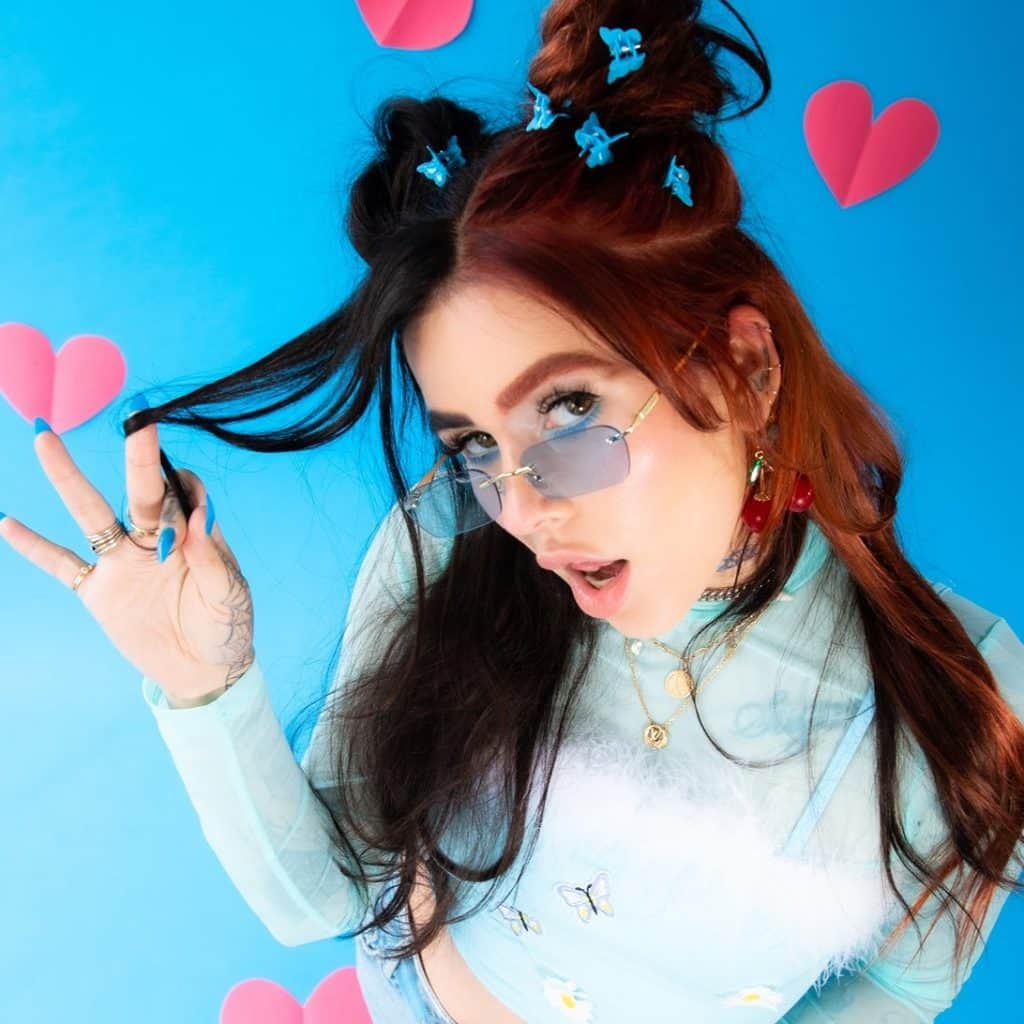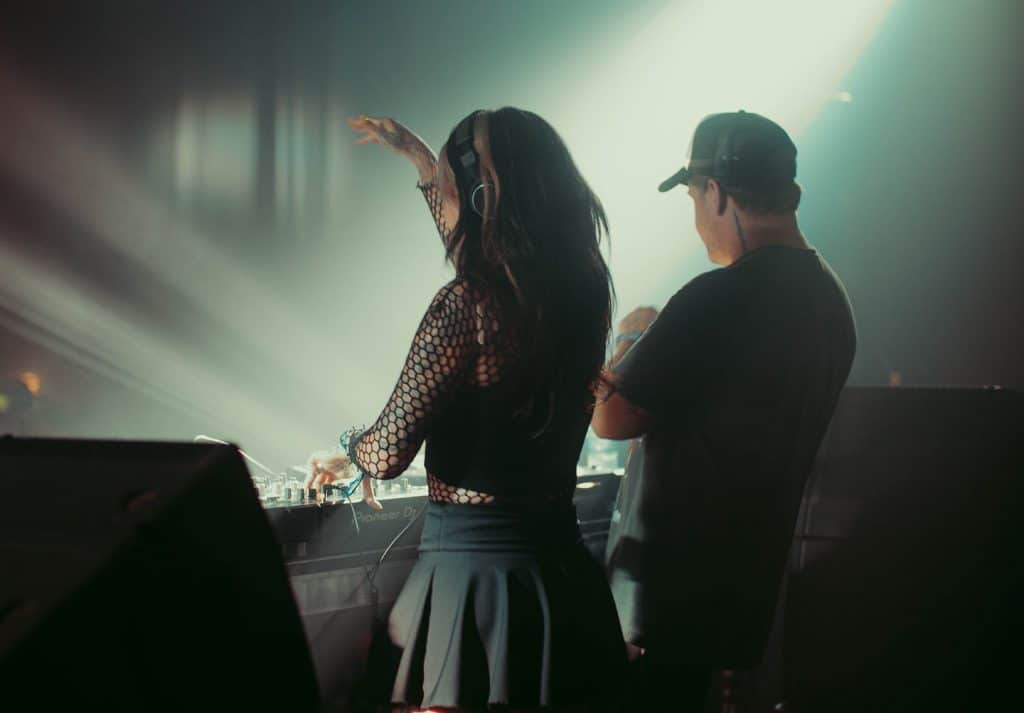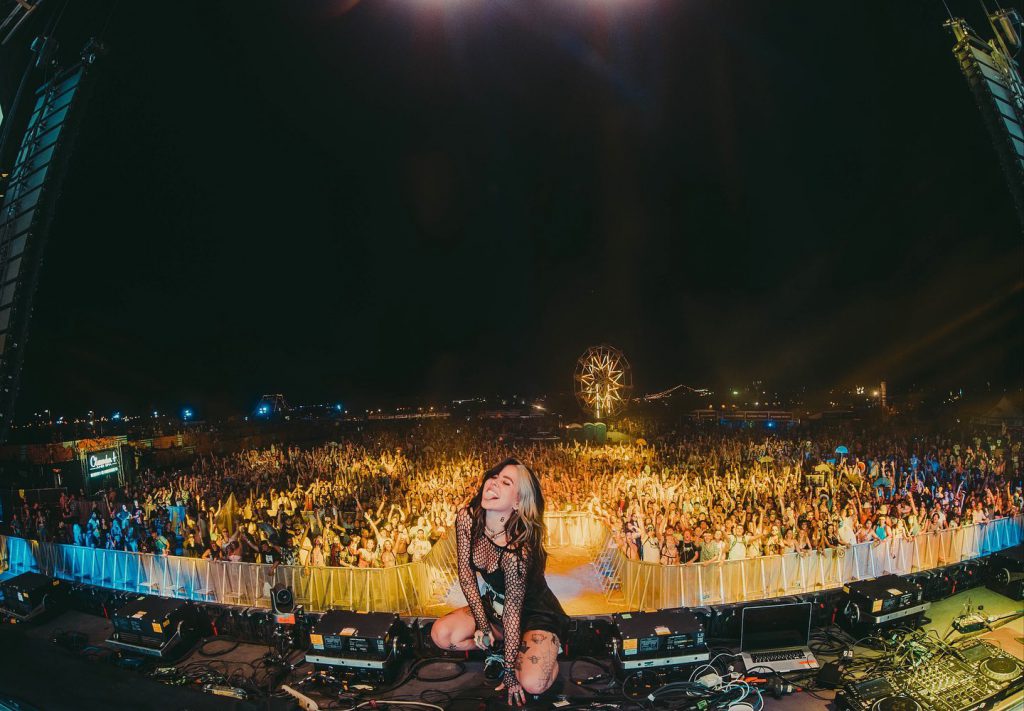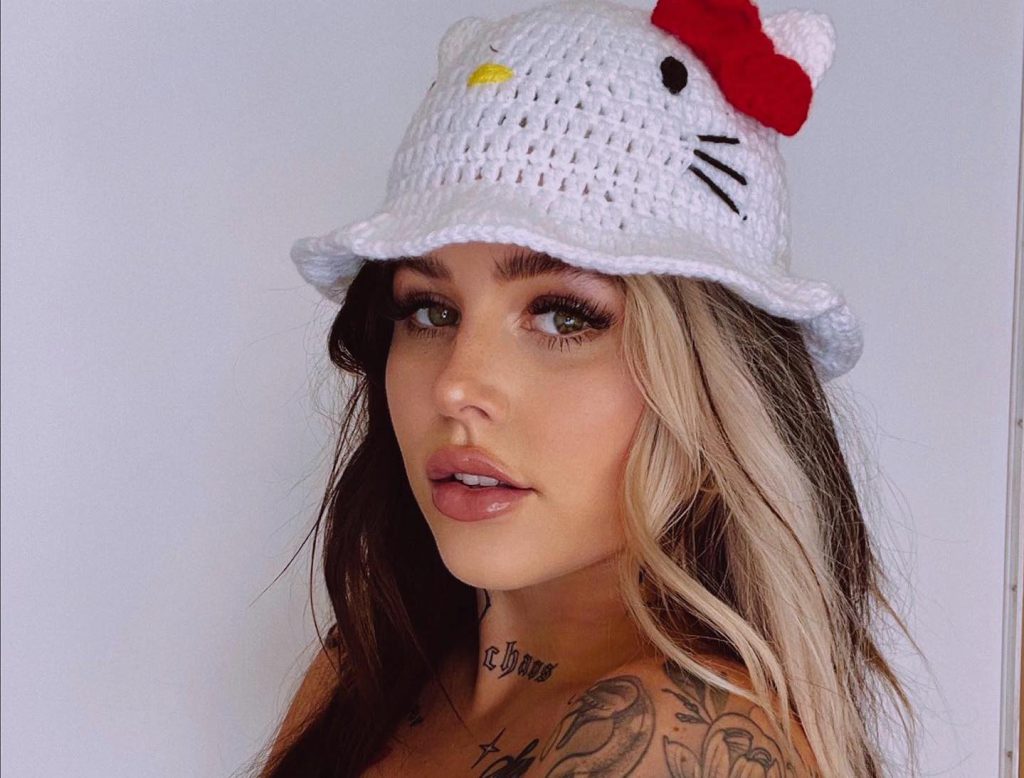After being diagnosed as an adult, later in life, CRAY discusses her experiences with autism, and the music scene.
If you’re following Cheney Ray, popularly known by her stage name, CRAY, on Instagram, Twitch, or have come across her social media, you know how vocal she is about being an advocate for autism awareness. The producer and gamer from Los Angeles was diagnosed at twenty-eight years old, barely a year ago.
It’s a very common diagnosis for children, however it has become much more common among adults, especially women, who seek help via neuropsychologists. It was very easy for me to relate with CRAY during this conversation about some of her experiences because I too was diagnosed as neurodivergent as an adult.
Having been tested as a child and only diagnosed with ADHD, Cheney spent her childhood constantly confused and troubled by her disabilities. Once she moved from her hometown and was on her own, she felt that after living with the uncertainty for so long, she was comfortable going to seek the help she needed and went to Arizona to get tested where she received her diagnosis.
For those who can relate to getting diagnosed at a later age in life, you know it can be a positive feeling. You are more than the people who say you aren’t “normal”, you are an absolute “normal” individual who is not alone, and one who has a gift to be shared with the world. CRAY is constantly sharing positive vibes and messages to support fans that happen to be on the autism spectrum. She also constantly receiving messages from fans that inspire and uplift her, making her feel less alone, which is important for anyone on the spectrum or not.
CRAY shares her thoughts about being diagnosed at a later age while working in the music industry. Read on for our conversation!

Hi CRAY, thanks so much for chatting with me today. As you’ve gotten more open about your autism diagnosis at age 28, how did that impact your life? Did it lift a weight off your shoulders to know what had been troubling you
Yeah absolutely. It wasn’t a shocking revelation to me. From the jump, I’ve always had stuff going on since I was born. I’ve been going through testing all through my adolescence, so I knew I wasn’t normal per se.
When I got my diagnosis in my teenage years, I was really ashamed and embarrassed and scared to understand what I am and what problems I have, because no one at the time in those early 2000s in my school in Canada was doing those things. There was no special education yet; none of that was happening at my school. I was the first, so it was really scary for me. I was the only one having problems. I was the only one not being able to do it. I was really ashamed.
I completely understand that.
So when I grew up and went to college, I made a promise to myself. I’m going to leave this place. I’m going to start new. I’m not going to take my medication. I’m not going to tell anyone. I’m not even going to know what’s wrong with me. I’m going to be like a normal kid. Maybe it was just high school. I’m going to push this to the side and tell everyone that I don’t need help and that I’m great.
And then, of course, I got to college, and it was a disaster. I was off my meds, I had no idea what I wanted to do, and I struggled so hard to pay attention – like I couldn’t understand. I was just really having a hard time fitting in socially too, just having a really hard time, and I was alone out there. I moved from Canada to California and didn’t know a single person, so I felt like even more of an oddball.
After college, that was a super dark time for me and such a period of growth. I’m finally living on my own in LA. I finally got to this place of going to therapy and understanding who I am and just questioning why I am the way I am and why I struggle with certain things that none of my peers struggle with. Maybe I should just look at my evaluation as a kid– maybe I should stop being so ashamed of it, and maybe it would help me learn more. So I asked my mom to ship me my evaluation– which was literally like a box of 500 pages.
I’ve got one, too; they’re crazy.
I was like, how am I going to start reading all of this? And so I started reading and understanding myself and seeing what I was diagnosed with at the time when I was a kid.
Like from someone else’s perspective?
Yeah, it just makes sense to hear it. Like, “Oh, that’s why I struggle with this,” or “that’s why I do this.” So reading that finally was a chapter where I realized I could ask for help and focus on what I needed. Now I live with a partner who loves me. I have time to ask why I’m struggling with these things, focus on them, and not be ashamed of them.
As I looked through my diagnosis, it had been so long, being on the same medication for ten years. I was getting to the point where I thought maybe I needed to switch up my medications. I didn’t know because I didn’t think it was doing what I needed help with. I just wasn’t feeling like I was functioning well enough.
So I got tested again to try to change my meds. I went to Arizona during that process, and the doctor told me, “yes, you have autism. I’m sure this is not a surprise to you because you’ve lived this your whole life. A ton of people nowadays, especially women, are getting diagnosed older, so don’t feel like you’ve waited too long. You’ve accepted it in your life when you did.” And when I finally got that diagnosis, I think it just made me feel like, “okay, so I’m not alone.”
Yeah, and maybe things got a little clearer?
Yeah, there are people like me out there. Some people struggle worse than me, and some struggle less than me on the spectrum, and I feel a little better knowing I’m not alone alone in this world. Some people empathize and feel the same things, so hey, maybe you shouldn’t be so ashamed of who you are because there are other people like you too, and maybe it’s a gift!
So I tried to get through that in therapy, accept who I am, and understand myself more. Now it’s so much easier for me to ask for help, to seek out guidance. Especially if I’m in public or at the airport, it’s so much easier for me to be an advocate now for myself. “I have autism; I’m really uncomfortable right now; I don’t know what you’re saying. Can you please write this down for me?” and they do that.
Now I have those tools to say, “Hey, I want to change my medication. Here’s my updated information.” When certain people ask me for specific jobs, I can say, “Hey, I’m really uncomfortable with crowds like that, actually. Can this be worked out more?” Or during interviews, sometimes it’s hard for me to look at the camera all the time. It’s hard for me to make eye contact. Now I can advocate for myself compared to just living in a place where I was really uncomfortable all of the time.

I can absolutely understand this. So speaking of being uncomfortable- sensory issues are a huge speed bump for people who have autism. How do you overcome any speed bumps that happen when it comes to shows?
I feel like I talk about this with my therapist, and we laugh. This is the hardest job for someone like me. It’s hard for me to make music, it’s hard for me to sing music live, and it’s hard for me to perform. It’s hard for me to do all of that. At first, when I first started DJing, I would either drink or just throw up and just shake myself through a set to get through it. I turn my booth monitors so low because I can’t have all of it coming at once. So I have my booth pretty quiet compared to my boyfriend, who’s got his booth cranked. I also have my headphones and use them in other ways that DJs would use them.
Do you use noise-canceling features?
Yeah, I can do that. I also have certain things I have to do to make it more comfortable. I have certain repetition things I do with my feet during my set; that’s part of my autism that I didn’t know until my doctor told me about it. I was like, “Oh, that makes sense why I’m doing that, and no one else is.” It’s hard for me to use the mic, and it’s hard for me to make eye contact. I’m not very interactive; it’s hard for me to say, “Hey everybody!” It’s hard for me to be loud like that. But honestly, I’m just really, really overwhelmed.
I feel like DJing is like riding a bike almost. I’ve done so many shows that it’s easier for me to get up on stage, put my earplugs in, and do my thing. It’s so repetitious in my head. I feel focused on what I’m doing. Now that I’m doing the live stuff and I don’t really DJ anymore, it is such a different battle. It’s so vulnerable, and it’s about entertaining, and you have to look at people and be more interactive, where everyone is staring at you. Whereas when I DJ, I can hide behind my booth, and there are visuals, and I’m just doing what I’m doing.
When I’m live, everyone’s staring at you. I get really shy, and I get really blackout and just hope for the best. I have to only have one ear monitor in when I’m singing because if I have both, I can’t hear. I have to hear silence with my singing. I can’t hear just my singing, or I won’t know what’s going on, or I’ll trip and fall. So like a lot of that type of stuff.

On the note of music- according to the national library of medicine, “music improves social communication and auditory-motor connectivity in kids with autism.” Although it says kids, do you feel that music can help adults communicate where their voice cannot?
Absolutely! When I was in high school, I was the first kid in my entire school to have an iPod. I was able to listen to it during class because one of my IEP doctors at the hospital said, “you should try just putting headphones on her and playing some music when she’s doing tests or doing work and see how that works.”
So, at the time, my parents weren’t going to buy me a new iPod because that was the newest coolest thing, but my dad had one for work, and he let me use his. It had all his music on it and no pop or kids’ music, and he told me to try it out.
At first, I was like a target, like, “why does this girl get an iPod in class? that’s such bullsh***”,” and I couldn’t hear anyone. I just had the iPod in, but that was my first introduction to music helping my life. So from that day on, I’ve always had my headphones on and always have music playing at all times, basically.
That’s awesome. I also had that accommodation for school and work. Have you met any other DJs that are open about their disabilities where you’ve connected with music? You don’t need to namedrop.
Yes! I talked to someone about it, and we’ve had some open, honest conversations where we both have similar viewpoints and feelings on certain things. I’ve also talked to Rezz, who’s never said anything about autism but has talked about being overwhelmed and how touring can be challenging. I know people who empathize with being overwhelmed and being overstimulated.
About the anxieties and such?
Social anxiety and all that plays in the cards. A lot of artists feel that way. I feel like I just scream it to the rooftops a little more than average.
That’s okay! We need people like that.
I agree.

What kind of accessibilities do you feel are a must for catering to fans on the spectrum? Like maybe fans that need a safe space.
I was always saying to my team one day; when I’m big enough, and I can have more control over the venues I can play, I would want to have areas set up where there are headphones, and there’s space because I know I don’t go into concerts. I’m scared of concerts; I’m always in the back-back. So I think it would be cool to have places for people to be able to take little silent, sensory breaks.
I’ve always thought about that during sets, especially selling stuff. You know there are so many things they could sell, like weighted blankets at shows. There are so many things that merch can be kind of- like fidget toys could be more introduced into average merch for people. I also always think there should be interpreters. I think everything should be accessible to every single person.
That’s why during COVID, I loved that the online things started happening more. I love that now more festivals are being filmed and live-streamed because those who can, who don’t want to go out, can still enjoy the festival. I think that’s a really important thing that we as a society kind of pushed.
How do you feel about educating others on the benefits of music for those with autism?
It’s my duty as someone with influence. I’m so new to this autism conversation because I was diagnosed at 28 years old, so I’m learning so much about the community, other people, and the spectrum itself.
I feel like I always need to voice that online and always be that voice and that person. That’s why I have it in my profile. That’s why I talk about it so much. I want people to feel like it’s not so taboo or scary to talk about – that you can be proud of who you are, and you don’t have to feel alone in this world.
So I think it’s really important to spread that awareness to people so they can feel like they’re not alone.
Absolutely. According to autism.org.uk, “musical patterns from strongly rhythmic to flexible and loose, can provide what an autistic person needs to help them regulate their thoughts and brain processes, creating more coherent and adaptable responses to the world around them.” Do you think this could be why you chose to pursue music?
Yeah, I mean, everyone in my life said they couldn’t see me doing anything else. I was not a musician growing up, even in college. I loved music and worked with music but was never like the girl on the guitar singing. I was thrown into this job and this life so authentically – it just happened. Maybe it was a comfort for me; music has always been my safe space.
So maybe that’s why I wanted to go in that direction for work, and I feel like it just fell together how it naturally should have. I feel like music was the safest space for me ever growing up, and gaming, the two loves of my life, which I’m blessed to be able to do.

Oh, for sure. Let’s close this one down with a few fun ones. Your website states that you’re a huge fan of tacos. What’s your go-to place in LA, and what’s your order?
Okay, so there are a few different things. My drunk night Taco Bell? Close to my heart. It’s not real Mexican, but still amazing. I get a Crunch-Wrap Supreme and a Baja Blast freeze; those are my favorite. There’s this place downtown called Loqui, and it’s fantastic. More like artisan bougie tacos, so they’re really, really good. Then there is Gracias Madre which is like vegan tacos and also really good. Then there’s like Cactus which is like the greasy and amazing burritos. I eat so many tacos.
So do I [Laughs]
Homestate is also amazing Tex-Mex. The queso tacos are so good.
Finally, I see you’re a big fan of Legos. In a previous Instagram story, you stated that they keep you calm, and I couldn’t relate more. Have you put together any exciting sets lately?
Oh my gosh, we just got the Fender guitar one that I haven’t done yet. I kind of finished the Mario box, the yellow question mark box. It’s really hard for me. It’s got moving parts on it, so it breaks every time I do this last piece, so I don’t know how to finish it. I need a gentle hand.
I just put together the Ghostbusters Mobile.
Hell yeah!
Well, I appreciate the time you spent talking with me. Do you have anything else you’d like to add?
No, thank you for the interview. It’s awesome, I love being able to talk about these things with people, and I love that more publications are talking about it.
Follow CRAY on Social Media:
Website | Facebook | Twitter | Instagram | SoundCloud | YouTube | Twitch








